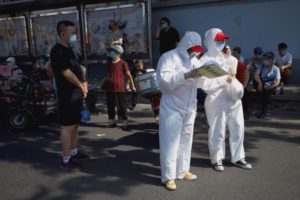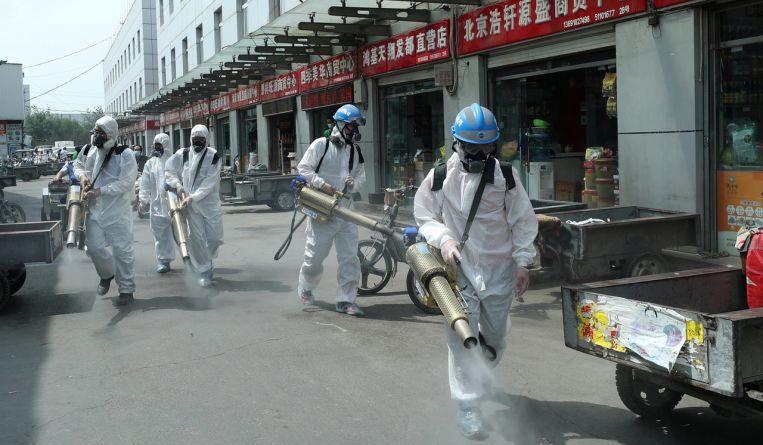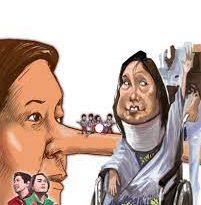COVID-19 PANDEMIC: Beijing raises coronavirus emergency response to second highest level
Volunteers in protective suits disinfect the Yuegezhuang wholesale market in Beijing on June 16, 2020.PHOTO: REUTERS / Tan Dawn Wei / China Bureau Chief
All schools will be shut from Wednesday, eateries will have to enforce social distancing and temperature-taking will be mandatory at public venues.
Those entering Beijing will also have to undergo a coronavirus test, while residents living in medium to high risk areas are barred from leaving the city.
Residential estates considered high risk will be put under lockdown, with residents not allowed out.
.
.
Medical staff members assist people for testing in Beijing, on June 16, 2020.PHOTO: AFP
.


Even at the height of the coronavirus outbreak earlier this year, the capital city was never put under lockdown unlike Wuhan and several other cities.
The latest move came as the number of infections from a wholesale food market continues to climb.
Health authorities reported 27 new cases on Tuesday, bringing the total in the capital city to 106 in the last five days.
The municipal government earlier suspended taxi and ride-hailing outbound services as well as inter-provincial bus links, locked down 29 residential communities and launched city-wide disinfection at markets, restaurants and public venues.
Describing the situation in the capital as “very grim”, government spokesman Xu Hejian said the authorities are leaving no stone unturned in curbing the most serious outbreak in Beijing since the coronavirus was first detected in Wuhan late last year.
.


.

.
“We must race against the clock, be proactive, always be ahead of the epidemic and take the most determined, decisive and strictest measures,” he told reporters at a news conference on Tuesday.
.


Beijing, a city of 20 million people, has enforced the strictest anti-coronavirus measures since the outbreak in Wuhan, restricting people from other provinces from entering and requiring planes to stop at other Chinese cities for checks before flying to Beijing.
It has recorded 526 local cases so far, fewer than other major provinces and municipalities in the country such as Guangdong, Shanghai and Zhejiang.
Xinfadi market in south-west Fengtai district, where the latest outbreak was discovered last Thursday, has become Beijing’s “top priority” in its anti-coronavirus work, said the health authorities, who have ordered mass testing, contact-tracing and quarantine for anyone linked to the city’s largest wholesale centre.
More than 270 markets and over 30,000 restaurants have carried out disinfection, while another 11 markets have been closed for more extensive cleaning, said Beijing authorities.
Restaurant operators say they have been ordered to send their staff for nucleic acid testing.
Beijing has the capacity to test as many as 90,000 people a day and has been racing to test all workers, visitors and close contacts of people related to Xinfadi market.
.



.
Officials say as many as 200,000 people have been to the market since May 30, and they are being tested and quarantined.
Two other markets have also had positive cases and have been shut, with residential communities around them put under lockdown.
Yuquandong market in the north-west district of Haidian and Tiantao Honglian market in the western district of Xicheng have had workers who were found to be infected.
.


..


Meanwhile, other provinces in China are putting their guard up against travellers from Beijing after Sichuan, Liaoning and Hebei discovered new cases originating from the capital city.
Shanghai on Tuesday directed some travellers from Beijing to be quarantined for 14 days, while Heilongjiang has required those from the capital city to test for the coronavirus.
Beijing had recently begun to relax its restrictions after nearly two months of recording no new infections.
But the latest rash of infections prompted the government to quickly restore some measures last Friday, such as registration at restaurants and malls. Gyms that had just reopened were ordered shut, while school reopening for lower primary students was delayed.
Traces of the coronavirus were said to have been discovered on a chopping board used by a seller of imported salmon at Xinfadi market, but the origin is still being investigated.
China’s customs authorities have reportedly started conducting tests on all shipments of imported meat for coronavirus. A trading executive with a major supplier told Bloomberg that port officials are conducting nucleic acid tests on all shipments of imported meat.
.


Read the latest on the Covid-19 situation in Singapore and beyond on our dedicated site here.
.


SIGN UP TO RECEIVE OUR EMAIL
.
The most important news of the day about the ASEAN Countries and the world in one email: [email protected]
6.17.2020










